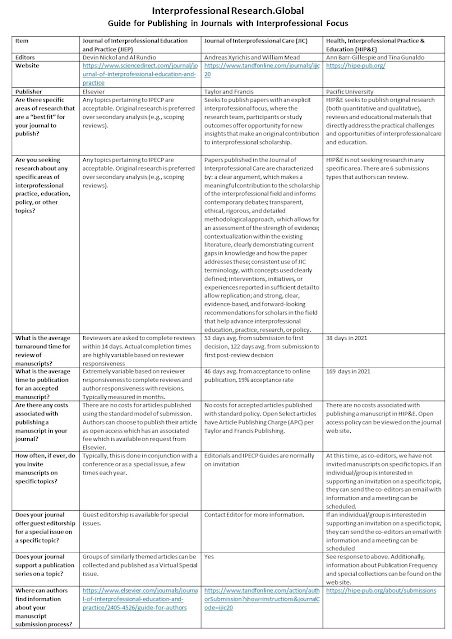Interprofessional Research Global (IPRG)'s Partnership Development Working Group engaged in a systematic process using a defined rubric to evaluate potential relationships with other interprofessional organizations globally. Organizations were explored based on information available through their websites to determine potential alignment and the feasibility of pursuing a potential working relationship. The Canadian Interprofessional Health Collaborative (CIHC) and the National Academies of Practice (NAP) were two of the organizations that were identified which appeared to have strong alignment with the mission, vision, and interprofessional values of IPRG.
In December 2022, IPRG approached NAP and CIHC to explore the possibility of engaging in a collaborative relationship on issues of mutual interest. In January 2023, leadership from NAP and leadership from CIHC each virtually met with the leadership of IPRG (President and members of the Partnership Development Working Group) to learn more about each other’s organization and to explore if, and specifically where, there might be areas of mutual synergy, interest, and strategic benefit between both organizations.
Following these two meetings, the IPRG Partnership Development Working Group drafted a Memorandum of Understanding (MOU) regarding the specific initiatives and information sharing that the leadership of both organizations had identified as potential areas for collaboration during the virtual conference call. A draft MOU was also shared with the leadership of IPRG to assess the feasibility of engaging in the specific initiatives and information sharing proposed for inclusion in the MOU. Following several iterations and revisions, the MOU between NAP and IPRG and CIHC and IPRG were finalized in May and signed by the leaders of each organization.
NAP and CIHC will discuss next steps with IPRG toward operationalizing the partnership agreements. Specifically, they will consider how best to proceed with defined areas of mutual interest in the MOU - including priorities, timelines, communications and outreach, and overall coordination. We are excited about these two new strategic alliances with IPRG and look forward to initiatives of mutual benefit that can advance all of these organizations in the future!
For more information on Canadian Interprofessional Health Collaborative go to: https://www.cihc-cpis.com/
For more information about the National Academies of Practice go to: https://www.napractice.org/
For more information about Interprofessional Research Global go to: https://interprofessionalresearch.global/









